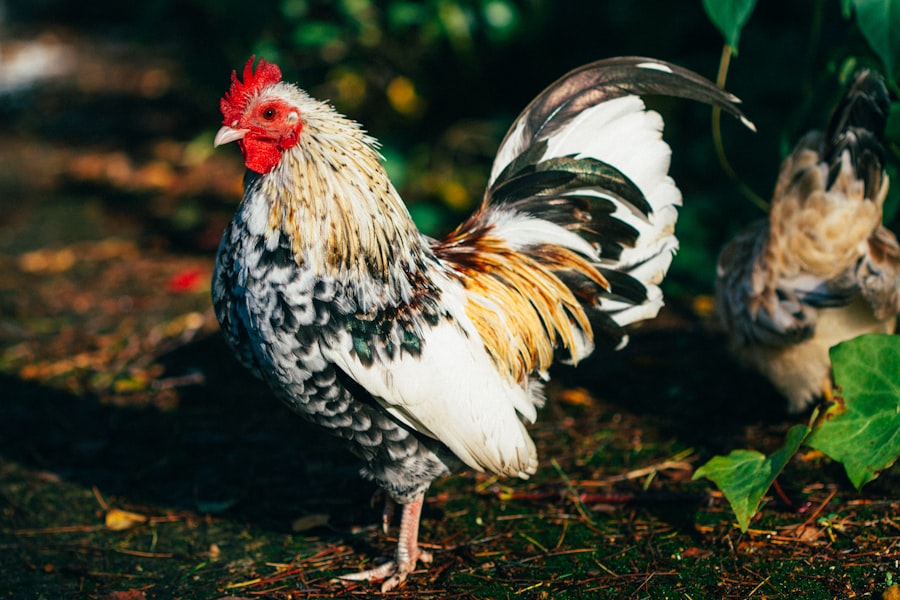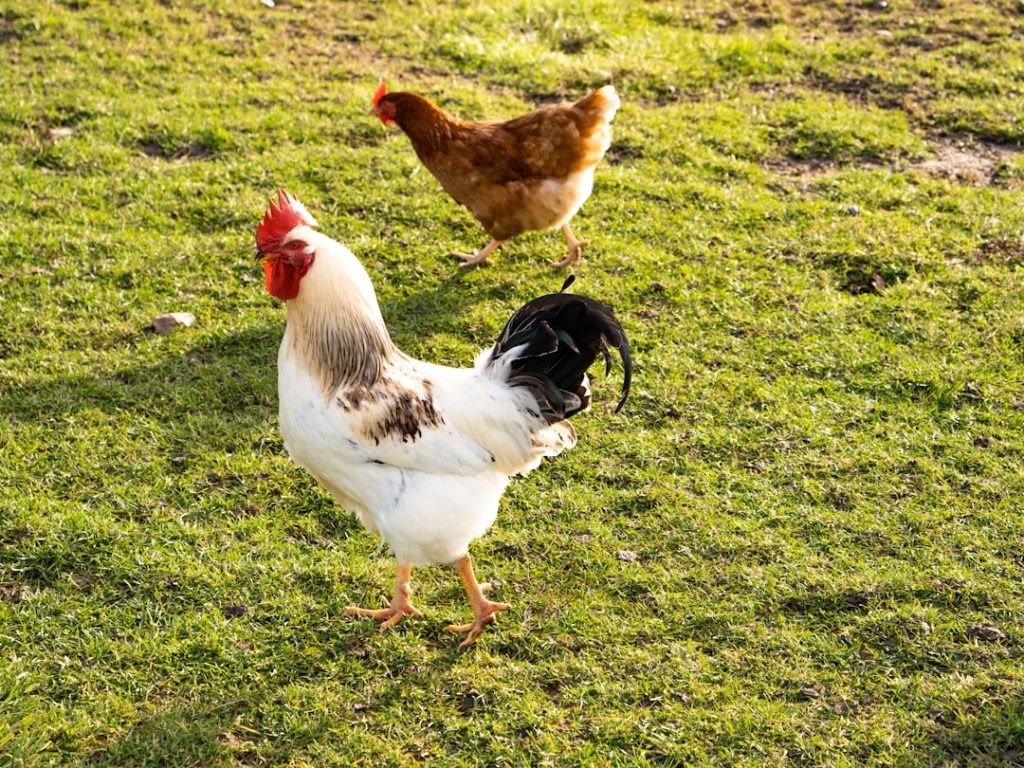Chickens are social creatures with a complex hierarchical structure within their flock, known as the pecking order. This hierarchy determines access to resources such as food and water. Observing flock dynamics is essential to ensure all chickens have adequate access to necessities and are not subjected to excessive bullying from dominant individuals.
Foraging is a natural instinct for chickens, who spend considerable time scratching and pecking the ground for food. Providing opportunities for this behavior is crucial for their mental and physical well-being. Chickens also thrive on routine and may become stressed if their established patterns are disrupted, particularly regarding feeding times.
Understanding these natural behaviors is key to creating an appropriate environment that meets the needs of a chicken flock and promotes their overall health and contentment. Proper management of these social and behavioral aspects is fundamental to responsible chicken care.
Table of Contents
Key Takeaways
- Chickens have natural foraging behaviors and prefer to peck and scratch for their food
- The right feeder should be chosen based on the size and age of the flock, and should be kept clean and free from contaminants
- Feeding schedules should be consistent and provide enough food for the entire flock
- Techniques such as using feeders with anti-waste features can help reduce food wastage
- Portion sizes should be monitored and adjusted based on the flock’s appetite and body condition
- The feeding area should be kept clean to prevent contamination and disease spread
- Behavioral issues in the flock should be addressed promptly to maintain a healthy and harmonious environment
Choosing the right feeder for your flock
Assessing Your Flock’s Needs
The size of your flock is a crucial consideration, as it will dictate the type of feeder required. Smaller flocks can thrive with simple trough or tube feeders, whereas larger flocks demand more substantial hanging or automatic feeders to ensure every bird has access to food.
Feed Type and Feeder Compatibility
The type of feed you use also plays a significant role in determining the best feeder for your chickens. For instance, if you use crumbles or pellets, a feeder with smaller openings is necessary to prevent waste and spillage. Conversely, if you use whole grains or scratch, a larger feeder with wider openings is more suitable.
Coop and Run Space Considerations
The available space in your coop or run is another essential factor to consider when choosing a feeder. Hanging feeders can help conserve space and prevent contamination from droppings, while automatic feeders ensure your flock always has access to food, even when you’re not present.
Implementing feeding schedules
Implementing a feeding schedule is important for maintaining the health and well-being of your flock. Chickens thrive on routine and will come to expect feeding times, so it’s important to establish a consistent schedule. Feeding your chickens at the same time each day can help prevent stress and agitation, as well as promote healthy eating habits.
Additionally, a feeding schedule can help prevent overeating and obesity, which can lead to health issues in chickens. When implementing a feeding schedule, consider the specific needs of your flock. For example, young chicks may require more frequent feedings than adult chickens, while laying hens may benefit from additional calcium supplements during certain times of the year.
It’s also important to consider the amount of feed your flock consumes each day and adjust your feeding schedule accordingly. By monitoring their eating habits and adjusting their feeding schedule as needed, you can ensure that your flock receives the proper nutrition and maintains a healthy weight.
Utilizing feeding techniques to reduce waste
Reducing waste is an important consideration when it comes to feeding your flock. Wasted feed not only increases your costs but can also attract pests and lead to unsanitary conditions in your coop or run. There are several feeding techniques you can utilize to reduce waste and ensure that your flock receives the nutrition they need without overfeeding them.
One effective technique is to use feeders with built-in barriers or dividers that prevent chickens from scattering or scratching out their feed. Another technique is to use feeders with adjustable openings that allow you to control the flow of feed and prevent spillage. Additionally, consider using feeders with covers or lids to protect the feed from moisture and pests.
By utilizing these feeding techniques, you can help reduce waste and ensure that your flock receives the proper nutrition without creating a mess in their feeding area.
Monitoring and adjusting portion sizes
Monitoring and adjusting portion sizes is an important aspect of feeding your flock. Chickens have different nutritional needs at various stages of their lives, so it’s important to monitor their eating habits and adjust their portion sizes accordingly. For example, young chicks may require smaller, more frequent meals to support their rapid growth, while adult chickens may require larger portions to maintain their energy levels and egg production.
Additionally, consider the specific needs of individual chickens within your flock. Some chickens may be more active or have higher energy requirements than others, so it’s important to monitor their body condition and adjust their portion sizes as needed. By monitoring their eating habits and body condition, you can ensure that each chicken receives the proper nutrition and maintain a healthy weight.
Keeping the feeding area clean and organized

Preventing Contamination and Pests
To keep the feeding area clean, consider using feeders with covers or lids to protect the feed from moisture and pests. Additionally, regularly clean and sanitize feeders to prevent the buildup of bacteria and mold.
Removing Spilled or Soiled Feed
It’s also important to regularly remove spilled or soiled feed from the feeding area to prevent contamination and attract pests.
Creating a Healthy Environment
By keeping the feeding area clean and organized, you can create a healthy environment for your flock and promote their overall well-being.
Addressing behavioral issues in the flock
Addressing behavioral issues in the flock is an important aspect of providing them with the best care. Chickens are social animals with complex social structures, so it’s important to monitor their behavior and address any issues that may arise within the flock. One common behavioral issue in chickens is bullying or aggression, which can lead to stress, injury, and reduced egg production.
If you notice any signs of bullying or aggression within your flock, it’s important to intervene and separate any aggressive birds to prevent further harm. Additionally, consider providing multiple feeding stations to prevent competition and aggression over food. This can help reduce stress within the flock and ensure that all chickens have access to food without being bullied or excluded by more dominant birds.
By addressing behavioral issues in the flock, you can create a harmonious environment for your chickens and promote their overall well-being. In conclusion, understanding the behavior of chickens is crucial for providing them with the best care and ensuring their well-being. Choosing the right feeder for your flock involves considering factors such as the size of your flock, the type of feed you use, and the space available in your coop or run.
Implementing a feeding schedule is important for maintaining the health and well-being of your flock, as it helps prevent stress, overeating, and obesity. Utilizing feeding techniques such as using feeders with built-in barriers or dividers can help reduce waste and ensure that your flock receives the proper nutrition without creating a mess in their feeding area. Monitoring and adjusting portion sizes is essential for meeting the specific nutritional needs of your flock at various stages of their lives.
Keeping the feeding area clean and organized is crucial for preventing disease, reducing the risk of pests and parasites, and promoting a healthy environment for your flock. Finally, addressing behavioral issues in the flock is important for creating a harmonious environment and promoting their overall well-being. By considering these factors and implementing best practices for feeding your flock, you can ensure that they receive the proper nutrition and care they need to thrive.
If you’re looking for tips on how to keep chickens from wasting food, you might also be interested in learning about the best kind of coop for chickens. Check out this article to find out more about creating the ideal living space for your feathered friends.
FAQs
What are some common reasons why chickens waste food?
Chickens may waste food due to overfilling of feeders, poor quality or spoiled feed, or inefficient feeding systems.
How can I prevent chickens from wasting food?
To prevent chickens from wasting food, you can use feeders with anti-waste features, such as adjustable feeding ports or feeders with a grill to prevent scratching. Additionally, regularly cleaning and maintaining feeders, providing the right amount of feed, and using high-quality feed can help reduce food waste.
Are there any feeding strategies to minimize food waste?
Feeding chickens smaller, more frequent meals can help reduce food waste. Additionally, using feeders with a lip or cover to prevent chickens from flicking feed out can also be effective.
What are some alternative ways to use food scraps to minimize waste?
Food scraps can be used as treats for chickens, as long as they are safe and appropriate for their diet. Additionally, composting food scraps can be a sustainable way to minimize waste and provide nutrient-rich compost for gardens.
Meet Walter, the feathered-friend fanatic of Florida! Nestled in the sunshine state, Walter struts through life with his feathered companions, clucking his way to happiness. With a coop that’s fancier than a five-star hotel, he’s the Don Juan of the chicken world. When he’s not teaching his hens to do the cha-cha, you’ll find him in a heated debate with his prized rooster, Sir Clucks-a-Lot. Walter’s poultry passion is no yolk; he’s the sunny-side-up guy you never knew you needed in your flock of friends!







